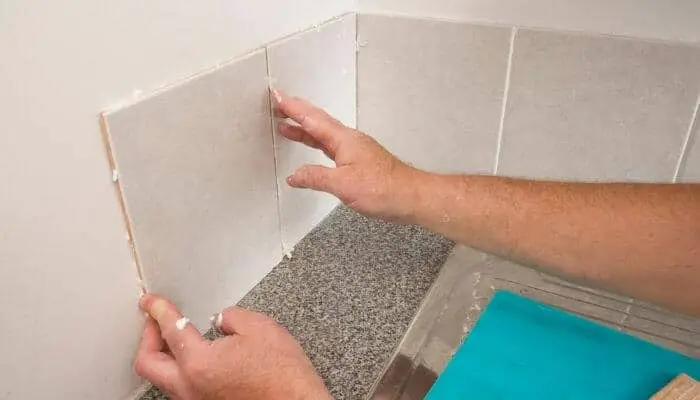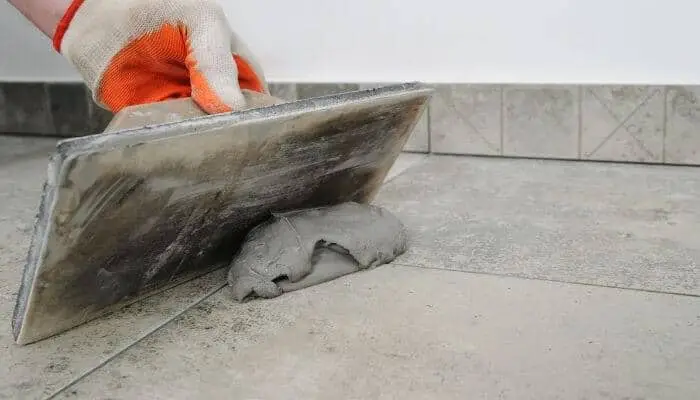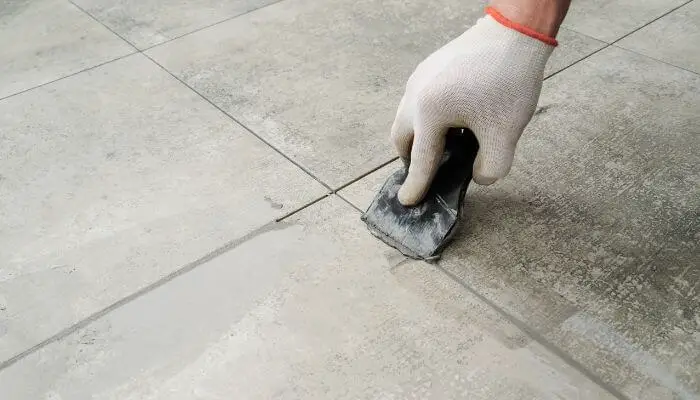Grout is water-resistant, but not waterproof.
The key to the success of grout, especially tile grout, is that it needs a very long time submerged in water before it becomes prone to allowing water through.
Tile Grout is Fit for Purpose
One may ask why people use tile grout if it is not waterproof, and the answer is that it is fit for purpose.
It has a small amount of give, and if correctly mixed, will not be too brittle.

Its solid, rigid and condensed structure means that water takes a very long time to get through.
In fact, even if tile grout is exposed to water for decades, the water will not cause significant damage.
Water may seep through all the way to the other side, but it is at such a slow rate as to often not matter to whoever is using it.
Grout is a Very Dense Material
Made from sand, silica, silicon, and a variety of other different materials, grout is made to have a condensed cement nature.
The types you see on bathroom tile walls have different components to the synthetic silicone heavy grouts you see in swimming pools.
Nevertheless, the solid cement nature of the grout means that it is fit for purpose and able to withstand submersion in water and years of water exposure without taking damage and becoming less waterproof.
Grout Has Different Materials to Make it Fit for Purpose
As mentioned earlier, grout can have different components depending on what it is being used for. The most common type you see is on tiles in kitchens and bathrooms.

It is made of Portland cement, filler particles of varying sizes, a water-retentive additive and some coloured pigments.
Most of these types of grout are porous, which means they can absorb water, which is why you may see them grow mould if they are not allowed very much time to dry.
However, they still take a long time for water to seep all the way through and cause damage, which is why tiling grout is seen so often in bathrooms and kitchens.
If you were looking for a grout to put at the bottom of your swimming pool, then you need more of an epoxy grout or latex-modified grout, or even a chemical-resistant Furan resin grout.
The point is that the grouts are made with different materials to make them fit for purpose.
For example, your swimming pool grout needs to be extra resilient, extra water-resistant, and just a little bit more flexible so that it can handle the weight of the water and can handle the situation when the pool is drained.
Water Absorption and Mould
You can seal grouts to make it more water repellent.
On its own, tile grout is porous and will absorb water.
If the tile grout is exposed to water for a long time without being able to dry out fully, then mould will start to grow.
This is not a problem in and of itself, but mould releases chemical by-products that damage grout, and that damage makes the grout less waterproof.
Old and Worn Grout
As with most materials, as they age and become more worn, they become less waterproof and less water resistant. If you were to submerge just a block of fully cured grout in water, then it would break down over a few years.
However, most grouts are surrounded by tiles, and only a part of their surface area are exposed to water. Plus, the water exposure is often temporary.
That is why tile grout can last years without ever causing water seepage problems.

Old and even worn grout can still be fit for purpose. However, as mentioned, the more worn, the more damage, the older, and the more it is exposed to water and mould, then the quicker the grout becomes un-water-resistant.
Improper Mixing and Application
If tile grout is well made in the factory, and is well mixed upon application, then it will be fit for purpose.
This means that once it is fully applied and dried (cured), it will be very water-resistant and will remain fit for purpose for years.
On the other hand, if the composition of the grout is subpar, or if it is created poorly, or mixed incorrectly or in an incomplete manner, then this will severely affect the lifespan of the grout.
It will wear down more quickly, it will age more quickly, weather more quickly, and become less water-resistant more quickly.
The same is true when considering how grout is applied.
If it is applied well, then it will seal the tiles in a manner that doesn’t allow water to get through very easily.
As mentioned earlier, tile grout lasts a long time because only one side of its construct is exposed to water.
The parts touching the wall and the tiles are not exposed to water.
However, if the grout is applied shoddily, it will allow water to enter the grout in a variety of ways, to touch more of the surface area than it should, and the grout will age more quickly.
Application matters quite a bit because the better the grout is applied, the smoother it is applied, and the better it creates a seal, then the longer the grout lasts.
Even if you seal the tiles well and no water is allowed to slip around to the back, a rough surface will make it easier for water to enter and for mould to grow.
Also, a rougher grout surface also makes the tile grout harder to clean, which again makes it easier for mould to take hold and start spewing out its damaging by-product chemicals.

